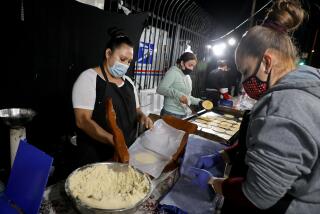Carlos Marcello; Gulf Coast Crime Figure
- Share via
METAIRIE, La. — Carlos Marcello, the self-styled tomato salesman who law enforcement agents said was the organized crime overlord for the New Orleans and Mississippi Gulf Coast areas, died Tuesday at his suburban New Orleans home. He was 83.
The Jefferson Parish coroner’s office said Marcello died at his home but it did not have the cause of death. He had been in failing health for years and lived in Metairie since his 1989 release from prison, where he served time after being convicted in a federal bribery sting. In prison, he suffered a series of minor strokes.
Recent news accounts mentioned his name in connection with the assassination of President John F. Kennedy, but no official link was ever made. This year, the PBS program “Frontline” interviewed an associate of Tampa crime boss Santo Trafficante who quoted Trafficante as saying Marcello had “messed up” when he had Kennedy killed.
Marcello first became well known in the New Orleans area during the heyday of open gambling in suburban Jefferson Parish in the 1940s.
He was born in Italy in 1910 as Calager Minacore and was brought to Louisiana as a baby. He served time in prison for robbery and marijuana distribution in the 1930s.
By the 1950s and ‘60s, police and national publications were calling Marcello “The Little Man” because of his 5-foot, 2-inch height and designating him the head of organized crime along the Gulf Coast. He always insisted he was a tomato salesman.
In 1961, the portly felon was deported to Guatemala at the urging of Atty. Gen. Robert F. Kennedy, but he made his way back into the country and fought deportation for rest of his life.
In 1981, he was convicted in California of conspiring to bribe a federal judge and was sentenced to serve seven years.
In 1982, he was convicted in Louisiana of conspiracy to violate federal racketeering laws under an indictment alleging mail fraud. After FBI agents posed as crooked insurance executives, prosecutors said Marcello masterminded a bribery scheme to win a multimillion-dollar state group insurance contract.
He was sentenced to serve seven years, but the U.S. Supreme Court invalidated the mail fraud statute under which he was prosecuted.
More to Read
Sign up for Essential California
The most important California stories and recommendations in your inbox every morning.
You may occasionally receive promotional content from the Los Angeles Times.













